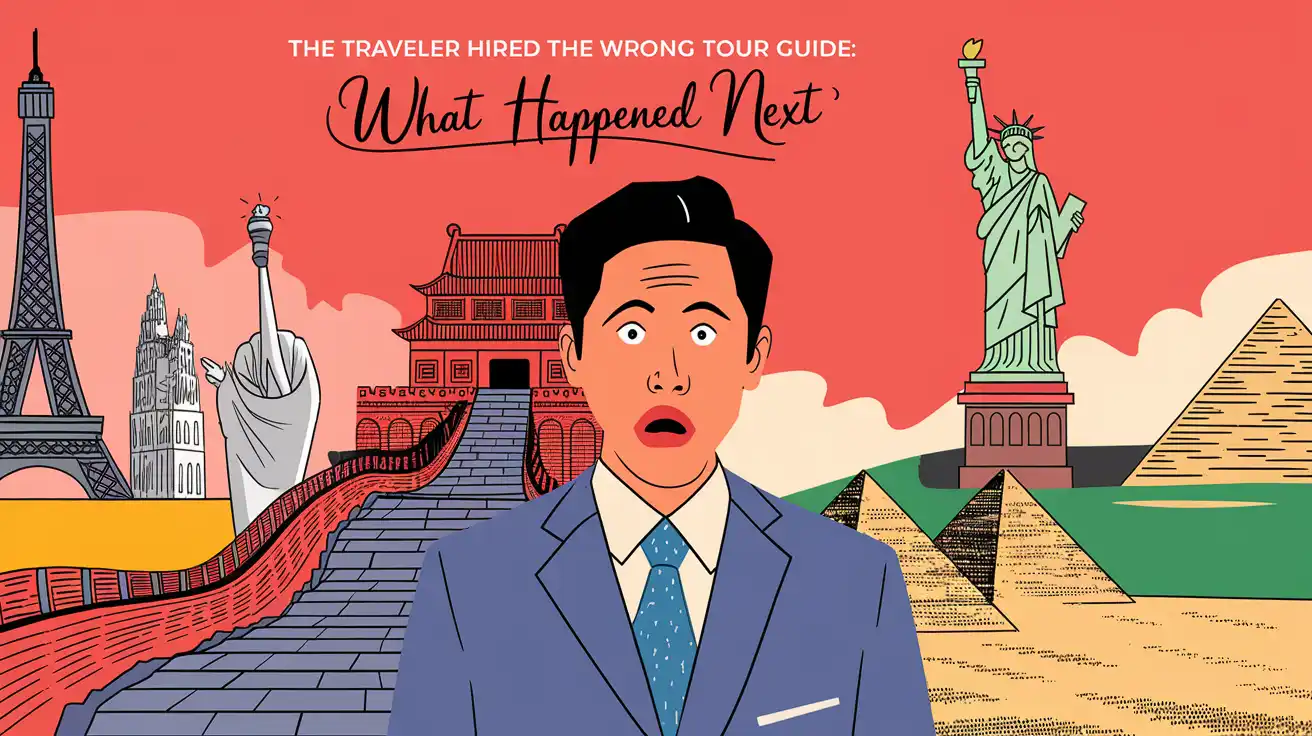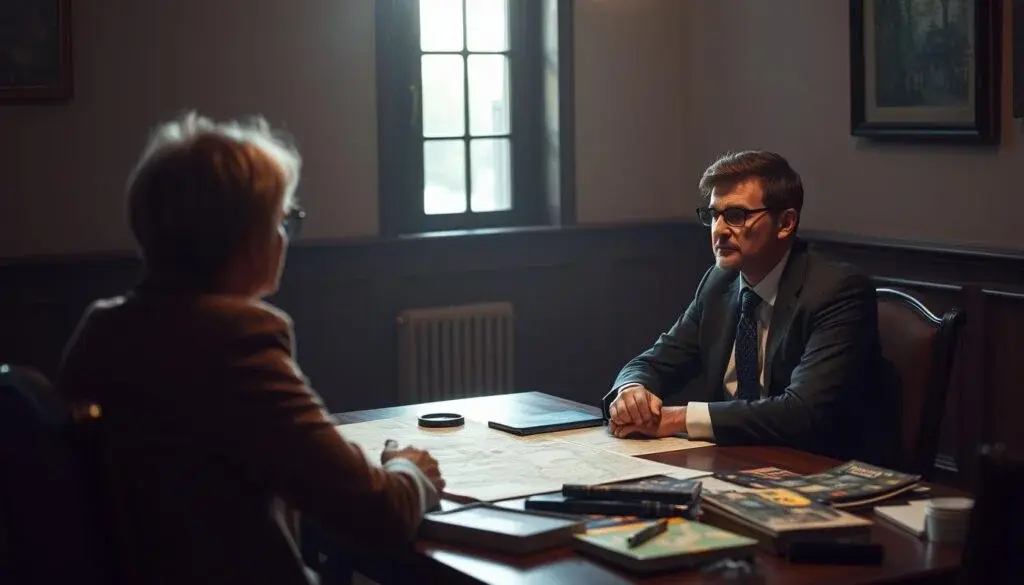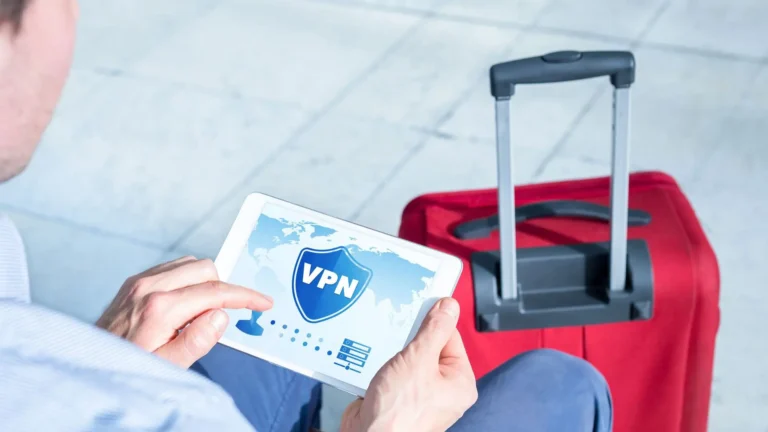
Every year, thousands of travelers face a common regret: hiring a bad guide. This turns their adventure into a travel mishap. Imagine booking a trip of a lifetime, only to realize too late you’ve chosen the wrong tour guide.
From wasted time and money to safety risks and missed cultural moments, a bad tour experience can overshadow even the most exciting destinations. How do you avoid becoming another travel planning mistake statistic?

Key Takeaways
- Choosing the wrong tour guide can lead to traveler’s regret and costly travel mishaps.
- Over 60% of travelers report bad tour experiences due to poor guide selection.
- Hidden risks like language barriers or unlicensed guides may leave you stranded mid-trip.
- Smart tour guide selection advice can transform chaotic trips into memorable adventures.
- Learning from others’ mistakes prevents you from repeating their worst travel planning errors.
When The Traveler Hired The Wrong Tour Guide: Real Stories and Consequences
Travelers share their bad experiences with the wrong tour guide. These stories show how wrong choices can ruin trips. Learn from their mistakes to keep your travel experiences safe.
Financial Losses and Wasted Time
Choosing the wrong guide can lead to financial losses. Guides might overcharge or not deliver what they promise. A family in Rome paid $500 for a private tour but waited hours in lines instead of seeing sights.
Others booked tours last minute and found hidden fees for tickets or transport. These costly mistakes can turn a dream vacation into a budget disaster.
- $200+ average cost of unlisted fees in 2023, per U.S. travel surveys
- 40% of travelers report time wasted due to poor itinerary planning
Safety Issues and Close Calls
“Our guide took us through a dark alley at night—no one responded when we asked for alternatives.” – Sarah, Paris visitor
Ignoring safety concerns can lead to dangerous situations. Guides who don’t follow safety rules can put travelers at risk. A group in Mexico almost missed a curfew because of a guide’s bad navigation, causing panic.
Always choose guides who know emergency protocols to avoid bad experiences that ruin your trip.
Missing Out on Authentic Experiences
| Authentic Experience | Tourist Trap |
|---|---|
| Local market visits with artisans | Overpriced souvenir stalls |
| Hidden gem recommendations | Crowded photo spots |
A wrong guide might take you to generic spots, missing authentic experiences. Many travelers regret following guides who skipped cultural sites for quick photo ops. Missing these moments can leave you with a frustrating experience that stays with you long after the trip.
Red Flags: How to Spot a Potentially Bad Tour Guide
Choosing the wrong tour guide can ruin your trip. Learn to recognize red flags early to avoid a poor guide or incompetent tour guide. Here’s what to watch for when evaluating potential guides:
- Vague answers: A fraudulent guide might dodge questions about local history or safety protocols.
- No clear policies: Unclear terms about cancellations or refunds signal a lack of professionalism.
- Pushy sales tactics: Insisting on add-ons without explanation could mean they prioritize profit over your experience.
- Low energy: A lack of enthusiasm or lack of engagement hints at a disinterested incompetent guide.
| Red Flag | What It Means |
|---|---|
| Unprofessional communication | Poor customer service or typos in emails |
| Overpromising | Unrealistic claims about exclusive access or guarantees |
| Ignoring feedback | Refusal to adapt to your interests shows lack of engagement |
Many travelers ignore warning signs until it’s too late. Don’t let excitement cloud your judgment.
When researching potential guides, cross-check reviews and ask detailed questions. A wrong guide might dismiss your concerns or avoid specifics. Trust your gut—if something feels off, move on to a better option.
The Impact of Poor Communication Skills on Your Travel Experience
Good communication skills are key for a great trip. Without them, even the best plans can fail. Imagine not understanding directions or missing local stories because of language barriers.
Language Barriers That Affect Your Understanding
Even with English language reporting, communication gaps can confuse you. For instance, a guide might confuse historical dates or simplify cultural practices too much. Misunderstandings at the start often point to bigger issues.
Ask: “How do you explain lesser-known sites?” A vague answer might mean they can’t share knowledge clearly.
Lack of Responsiveness in Initial Communications
Poor initial responses can signal bigger problems. If your emails are ignored or replies are slow, it’s a warning sign. Look out for:
- Delayed replies to itinerary questions
- Vague answers about safety protocols
- Ignoring follow-ups about dietary needs
These signs often show how they’ll handle emergencies or changes during your trip.
Inability to Adapt to Your Needs and Questions
Great guides adjust their communication style to match your interests. If they ignore your questions or stick to a script, it’s a sign of poor communication skills. Test their adaptability by asking:
“Can you share stories about daily life here, not just landmarks?”
A good guide will adapt; a bad one will keep repeating the same facts.
Credentials Matter: Verifying Your Guide’s Expertise and Licensing
Choosing the right guide is all about checking their qualifications. Licensed guides and professional tour guides with proper training ensure you get accurate information and safe experiences.
Here’s how to spot the difference between legitimate guides and self-proclaimed experts.

First, ask to see their certifications. Legitimate guides have official documents like government-issued licenses or credentials numbers. Use online databases from tourism boards or industry associations to confirm authenticity.
- Request a copy of their license or certification
- Contact the issuing authority to verify
- Check if they belong to professional associations
How to Check for Legitimate Certifications
Legitimate guides show proof of training from recognized programs. Professional guides affiliated with groups like the International Association of Tour Managers (IATM) or the Professional Tour Guide Certification Board undergo rigorous testing. Avoid guides who claim expertise without official backing.
The Difference Between Licensed Guides and Self-Proclaimed Experts
Licensed guides meet strict standards. Professional tour guides with proper training know emergency protocols and local laws. Self-proclaimed experts might lack this, risking your safety and enjoyment. Always ask: “Who trained you?”
Industry Associations That Validate Professionalism
Associations like the Guild of Professional Guides list verified members. These groups require background checks and continuing education, ensuring guides stay knowledgeable. Use their directories to find reputable professionals.
Experienced guides certified by these organizations offer deeper insights than those without credentials. Trust the process—your journey deserves a guide who’s both knowledgeable and accountable.
Navigating Online Reviews: Finding the Truth About Tour Guides
Online reviews are a great way to find a good tour guide. But, how do you know what’s real? Look beyond the stars. Positive reviews without dates or locations might be copied. Check customer reviews on Google Reviews and TripAdvisor to find any differences.
“The first post about a guide often reveals the truth,” says travel advisor Sarah Lin. “Fake reviews feel too perfect or vague.”
- Scrutinize negative reviews for specific complaints, like “canceled stops” instead of “disorganized.”
- Compare original post dates on multiple sites—duplicate entries may signal paid reviews.
- Trust detailed google reviews with photos or trip dates, which are harder to fake.
| Platform | Key Tip |
|---|---|
| Google Reviews | Use the “Sort by recent” filter to spot 1st post reactions. |
| TripAdvisor | Look for reviews mentioning local landmarks to confirm authenticity. |
Ask yourself: Do positive reviews match your travel goals? A guide praised for nightlife might not be right for your history trip. Check social media for more info. When unsure, choose reviews with exact dates or locations—they’re more likely to be real.
Pricing Pitfalls: When Cheap Tours Come at a Different Cost
Choosing the right tour guide is more than just looking at the price. It’s about finding the right balance between value and safety. Pricing pitfalls can hide risks like unlicensed guides or lack of accountability. Here’s how to steer clear of these traps and protect your investment.

“The cheapest option isn’t always the best deal when it skips safety nets like contracts or licenses.”
Be cautious of cash-only deals that ask for payment upfront in cash. A cash business without receipts or licenses might be a sign of a not legit business. Reputable travel agent companies use credit card service contracts to protect payments. Always ask for written agreements with credit card company protections.
- Verify if a guide in cash is standard in the area or a red flag
- Ask for licenses to confirm the legit business status
- Require written terms outlining refunds and cancellations
- Use credit card service contracts for dispute resolution rights
- Book through platforms that audit travel company credentials
- Always request itemized invoices even for cash-only deals
Safe payment methods and clear agreements ensure your trip isn’t ruined by hidden costs or unprofessional guides. Protect your adventure—and your wallet.
Questions You Should Always Ask Before Hiring a Tour Guide
Make your travel plans a dream vacation by asking the right questions. These questions help find out if a guide is reliable and meets your needs.
- “What specific experience do you have working with travelers like me?”
- “How do you handle unexpected disruptions?”
- “What safety protocols are in place during tours?”
- “Can you tailor the itinerary to my interests?”
- “Are these private tours or group trips? What’s the typical group size?”
“A guide’s answers reveal as much as their resume,” says a travel advisor. “Listen for passion and preparedness.”
Always check if the guide in question gets what you need. Asking the right questions shows their dedication to your trip. By doing this, you avoid surprises and make sure everything is just right for you.
Creating a Memorable Travel Experience: What Great Guides Offer
Every traveler dreams of an unforgettable experience that stays with them long after they return home. A skilled guide turns a trip into an enriching travel experience. They mix knowledge, passion, and local insight. Imagine a journey where every moment feels meaningful and connected to the foreign land you’re exploring.
“A good guide doesn’t just point out landmarks—they reveal the soul of a place.”
Cultural Immersion and Local Connections
Great guides connect you to locals, offering authentic cultural experiences. They might:
- Arrange meals at family-run restaurants, not tourist traps
- Share stories about regional traditions and festivals
- Showcase crafts made by artisans in hidden workshops
These moments create a bridge between you and the culture, enriching your experience.
Historical Context That Brings Destinations to Life
Legendary guides add historical context to every visit. At an ancient site, they explain how events shaped a region’s historical significance. A ruined castle isn’t just stones—it’s a story of battles, politics, and daily life. This makes history feel alive.
Personalized Experiences Based on Your Interests
A standout guide tailors the adventure to your interests. If you love art, they’ll schedule extra time at a hidden gallery. If you’re into food, they’ll book a cooking class with a local chef. This customization ensures every detail aligns with your passions, making the journey unforgettable.
Choosing a guide who focuses on these elements makes your trip more than sightseeing. It becomes an unforgettable experience where every moment deepens your bond with the destination.
What to Do If You’ve Already Hired the Wrong Guide
If your travel plans hit a snag with an underwhelming guide, action steps can salvage your journey. Start by assessing the situation calmly before taking next steps.
Addressing Issues Directly With Your Guide
Open a respectful dialogue using clear examples. Say:
“During our day of exploration, I noticed gaps in historical details. Could we adjust the itinerary for deeper insights?”
- Highlight specific gaps like lack of knowledge about local history
- Propose compromises, like shorter group tours for an intimate atmosphere
- Focus on solutions rather than blame
When to Request a Refund
Contact the booking platform if your experience matches these red flags:
- Guide refuses to correct recurring errors
- Mediocre travel experience persists after feedback
- Service violates terms outlined in your agreement
Save screenshots of original itineraries and emails as evidence.
Switching to Better Options Mid-Trip
Rethink your approach with these strategies:
- Book a replacement Italian tour guide through trusted platforms
- Use independent exploration to discover hidden gems
- Consult hotel staff for curated day trips with certified guides
Even a misstep can lead to discovering unique local gems through adjusted plans.
Popular Destinations Where Guide Selection Is Crucial
When you visit Vatican City or Machu Picchu, the right guide is key. They unlock breathtaking landscapes and share hidden stories. These places need special knowledge to fully enjoy.
- Vatican City: Only Vatican-certified guides can enter restricted zones. They share art and history, revealing its depth.
- Machu Picchu: Peru-licensed guides know the lush landscapes and Incan heritage. They ensure safe hikes and share cultural context.
- Dynamic cities like Kyoto or Barcelona: Find guides who know the vibrant atmosphere and local secrets.
- Picturesque landscapes in Tuscany or New Zealand need guides who care for the environment and tell stories.
Choose guides with certifications. In dynamic cities, ask about their local connections. The right guide makes sightseeing unforgettable.
Conclusion: Ensuring Your Next Guided Experience Is Unforgettable
Choosing the right tour guide makes your trip amazing. Look for reliable guides to avoid bad experiences. This way, you save time, stay safe, and have fun.
Before booking, check if guides are certified and read reviews. A great guide connects you with local culture and meets your interests. This makes your trip unforgettable.
To find a good guide, check their credentials. Avoid cheap deals that might hide costs or poor service. Research well and choose guides who communicate clearly.
Even if past trips had issues, you can do better next time. Focus on quality, not just cost. This way, you’ll have a better experience.
Every place deserves a guide who turns sightseeing into stories. Plan smart, ask questions, and choose the right guide. Your next adventure is waiting. Safe travels and happy exploring!
Frequently Asked Questions
1. What should I look for when choosing a tour guide?
When picking a tour guide, look for credentials and licenses. Check online reviews and their communication skills. Make sure they know the area well and can tailor the tour to your interests.
2. How can I avoid hiring a bad tour guide?
To avoid a bad guide, do your homework and read reviews. Ask questions about their experience and services. Watch out for vague answers or slow responses.
3. What are some common mistakes travelers make when hiring a guide?
Don’t just pick a guide based on price. Ignore negative reviews at your own risk. Verify their credentials and check their communication skills. Value experience over a low budget.
4. How do language barriers affect my tour experience?
Language barriers can make it hard to understand the culture and history. Make sure your guide speaks your language well. This will make your tour better.
5. What should I do if I realize I’ve hired the wrong tour guide?
If you realize you made a mistake, talk to the guide nicely. If it doesn’t get better, ask for a refund. Look for a new guide online or locally. Keep records of your talks.
6. Are there specific certifications I should look for in a tour guide?
Yes, look for licenses from tourism authorities or certifications from associations. These show the guide follows safety and quality standards.
7. How can I interpret online reviews effectively?
Don’t just look at star ratings. Read the details in reviews. Notice patterns in language and feedback. This helps you tell if it’s a personal issue or a real problem.
8. What are the signs of an incompetent tour guide?
Signs include bad communication, lack of interest, and not knowing the area. Also, watch for pushy sales and inconsistent info. Trust your gut during the first meeting.
9. How can poor communication affect my travel experience?
Poor communication can cause misunderstandings about plans and cultural details. A guide who doesn’t listen to you might not give you a great experience.






